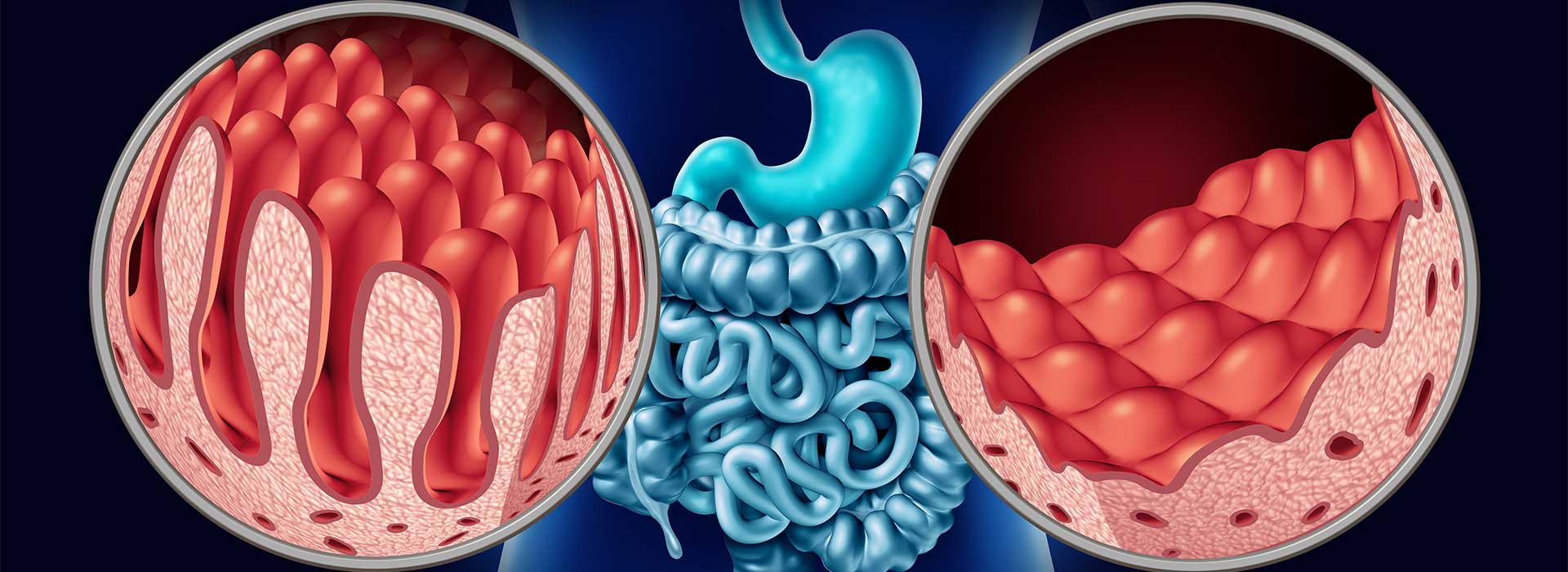Celiac Specialist for Treating Celiac Disease
Improve Your Quality of Life with Our Celiac Disease Treatment
If you’re struggling with celiac disease, our team of specialists in celiac disease is here to help. We offer personalized treatment that addresses your specific needs and improves your symptoms. We focus on providing long-term solutions so you can live a full and worry-free life.
Schedule a Consultation Today and Take the First Step Towards a Worry-Free Life
Celiac Specialists: Discover the Benefits of Their Treatments
- Personalized treatment based on your specific needs
- A multidisciplinary approach that addresses both the physical and emotional aspects of celiac disease
- Access to the latest diagnostic tools and treatments
- A team of celiac disease specialists with years of experience
- Proven track record of success in managing celiac disease
Our doctors specialize in celiac disease
If you have celiac disease, you know that finding a specialist can be a challenge. There are only a few hundred celiac specialists in the United States and even fewer in other countries. In fact, New York is one of the states with the highest concentration of doctors specializing in celiac disease. But which one is right for you? Here is a list of New York celiac specialists who are part of our team, perhaps one of them has already been recommended to you:
Where are we located?
At Triborough GI, we understand that making the switch to a gluten–free diet can be discouraging, but we‘re here to help you every step of the way. We‘ll work with you to create a personalized meal plan that fits your lifestyle and ensures you‘re getting the nutrients you need. You can find us at the following locations:
Our Locations
Important information about Celiac Disease
In this video, we explain in brief what this disease is all about:

What is Celiac Disease?

Image from: https://www.gastrojournal.org/
It is a digestive illness that affects the small intestine, making it difficult to absorb important nutrients, vitamins, and minerals.
This is caused because patients with this condition cannot tolerate the protein called gluten, which is mainly found in cereals. When a gluten-intolerant patient ingests foods containing this protein, their immune system is activated, causing damage to the mucosa of the small intestine and causing the well-known symptoms.
Contrary to common belief, gluten enteropathy is a systemic disease rather than merely an ailment of the alimentary tract. Genetically susceptible persons develop autoimmune injury to the gut, skin, liver, joints, uterus, brain, heart, and other organs.
Symptoms
This condition can cause a range of symptoms that can be mistaken for other illnesses. In some cases, symptoms may not always be present, but in any case, the intensity of the symptoms will be related to the ability to absorb nutrients and damage to the small intestine.
The following symptoms may be present (alone or in combination):
- Chronic diarrhea.
- Weight loss.
- Greasy, excessive bowel movements.
- Unexplained anemia.
- Recurrent abdominal pain.
- Flatulence.
- Bone and joint pain.
- Muscle cramps. Fatigue.
- Delayed growth.
Some people with celiac disease have no symptoms because the undamaged part of their intestine is able to absorb enough nutrients to prevent symptoms.
Risk Factors for Celiac Disease
Celiac Disease is related to an immune response, but its exact cause is unknown. Some factors appear to increase your risk of developing Celiac Disease, including:
- Family history of Celiac Disease
- Type 1 diabetes
- Autoimmune thyroid disease, such as Graves or Hashimoto’s thyroiditis
- Addison’s disease
- Rheumatoid arthritis
Gluten is the main environmental trigger of the disease. In addition, infant feeding and weaning practices as well as timing of gluten introduction in the diet have been suggested to contribute to CD risk. Furthermore, a role for infectious agents and microbiota composition in disease development has also been proposed3.
Dangers of Untreated Celiac Disease
Left untreated, it may result in various complications such as malnourishment, infertility, loss of bone density or even cancers such as intestinal lymphoma.
How is it diagnosed?
Diagnosis can be complicated because the symptoms may be similar to those of other diseases.
Biopsy is the most effective method to confirm the disease, but prior to biopsy, a blood test is performed to determine the levels of specific antibodies (ti-gliadin, anti-endomysial, anti-reticulin, and anti-transglutaminase). If the results are positive, the disease is confirmed by intestinal biopsy.
The fact that many cases of celiac disease are not diagnosed is a common problem in medical care. Patients may attribute their symptoms to stress, fatigue, or other factors and do not seek immediate medical attention for these symptoms. In addition, these can be similar to those of other conditions, which can complicate the correct diagnosis.
In a study published in The American Journal of Gastroenterology, 1612 Americans with confirmed celiac disease were surveyed. Among the findings were.
- The majority of respondents were diagnosed in their fourth to sixth decades.
- Symptoms were present a mean of 11 yr before diagnosis.
- Diarrhea was present in 85%.
- The diagnosis was considered prompt by only 52%
- 31% had consulted two or more gastroenterologists.
- Improved quality of life after diagnosis was reported by 77%.
- Those diagnosed at the age mayor de 60 yr also reported improved quality of life.
- Five respondents had small intestinal malignancies (carcinoma 2, lymphoma 3).
How is Celiac Disease treated?
It is important to treat celiac disease through a long-term gluten-free diet. This can help improve symptoms and prevent serious complications such as malabsorption of nutrients and other related health problems. If you suspect you may have celiac disease, it is important to talk to your doctor to receive an accurate diagnosis and appropriate treatment.
The only way to treat celiac disease is to maintain a strictly gluten-free diet. This means avoiding all foods containing gluten, even in minimal amounts. This regimen must be followed for the rest of one’s life.
Gluten is found in a wide variety of foods and may also be present in additives in manufactured products.
After starting the gluten-free diet, recovery may not be immediate, and duodenal biopsies may take up to 2 years to return to completely normal.
At the beginning of treatment, in addition to the gluten-free diet, vitamin or mineral supplements are often recommended to make up for any deficits and speed recovery.
However, a small percentage of patients with celiac disease do not experience the expected improvement with the gluten-free diet and require additional drug treatments. These patients are also more likely to develop disease-related complications.
To know if you have celiac disease, consult a doctor for evaluation and testing, including blood tests and potentially an intestinal biopsy.
Our specialized treatment helps manage symptoms by providing personalized diet plans, medication, and ongoing support to ensure adherence to a strict gluten-free lifestyle.
Symptom improvements vary, but most patients experience relief within weeks to months of starting a strict gluten-free diet.
Treatment coverage depends on individual insurance plans; consult your provider for specifics.
Doctors treat celiac disease primarily through a strict gluten-free diet, along with addressing any nutritional deficiencies or complications.
Triborough GI has the top NYC gastroenterologists in Brooklyn, Staten Island, and the Bronx. Our doctors provide only the most specialized and extensive care. Our motto is that the patient’s care comes first! Highly reputable and top-rated in NYC, our gastroenterologists will thoroughly examine, diagnose, and treat you in any way they can.
Schedule an appointment at (718) 795-2734 today with one of our Triborough GI doctors at our Brooklyn, Staten Island, or Bronx locations for any questions or concerns you have regarding Celiac Disease.
References
- Rewers, M. (2005). Epidemiology of celiac disease: what are the prevalence, incidence, and progression of celiac disease?. Gastroenterology, 128(4), S47-S51.
- Bojković, G., Caparević, Z., Ilić, V., Stojanović, D., Lalosević, D., & Stojanović, M. (2002). Prikaz slucaja: morbus coeliacus [Case report: celiac disease]. Medicinski pregled, 55(11-12), 532–534. https://doi.org/10.2298/mpns0212532b
- Sarno, M., Discepolo, V., Troncone, R., & Auricchio, R. (2015). Risk factors for celiac disease. Italian journal of pediatrics, 41(1), 1-5.
- Green, P. H., Stavropoulos, S. N., Panagi, S. G., Goldstein, S. L., McMahon, D. J., Absan, H., & Neugut, A. I. (2001). Characteristics of adult celiac disease in the USA: results of a national survey. The American journal of gastroenterology, 96(1), 126-131.











